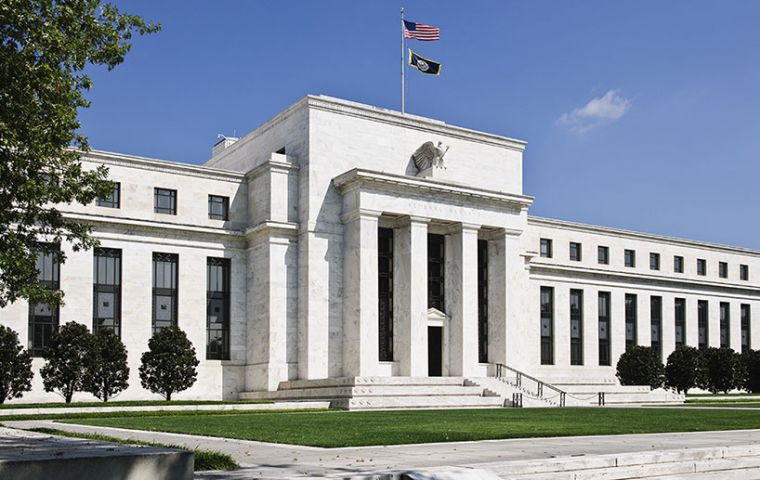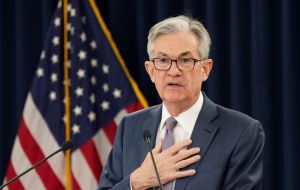MercoPress. South Atlantic News Agency
US Fed and Bank of England ramp up emergency responses to the escalating recession in unchartered waters
 The Fed, in its move to soften the historic shutdown of the U.S. economy, pledged US$ 2.3 trillion to help local governments and to prop up small businesses
The Fed, in its move to soften the historic shutdown of the U.S. economy, pledged US$ 2.3 trillion to help local governments and to prop up small businesses  The BoE said it would allow UK's government to run up an unlimited overdraft as the state promises to pay wages to millions laid off, cut taxes for businesses
The BoE said it would allow UK's government to run up an unlimited overdraft as the state promises to pay wages to millions laid off, cut taxes for businesses  With central banks to cocoon their shuttered economies while the shutdowns last, Fed chief Powell dismissed suggestions they risked creating an inflation surge
With central banks to cocoon their shuttered economies while the shutdowns last, Fed chief Powell dismissed suggestions they risked creating an inflation surge  BoE Governor Andrew Bailey has had to counter claims that the British central bank is resorting to direct monetary financing of the government
BoE Governor Andrew Bailey has had to counter claims that the British central bank is resorting to direct monetary financing of the government The U.S. Federal Reserve and the Bank of England ramped up their emergency responses to the world's escalating coronavirus recession on Thursday as they pushed deeper into territory once considered fraught with risk for central bankers.
The Fed, in its boldest move to date to soften the historic shutdown of much of the U.S. economy, pledged US$ 2.3 trillion to help local governments on the front lines of the health crisis and to prop up small and mid-sized businesses.
In London, the BoE said it would allow Britain's government to run up an unlimited overdraft as the state promises to pay wages to millions of people laid off during shutdown, cut taxes for businesses and expand its welfare system.
With central banks around the world trying to cocoon their shuttered economies while the shutdowns last, Fed chief Jerome Powell dismissed suggestions they risked creating an inflation surge or distorting the way companies do business.
Unlike the global financial crisis more than a decade ago, when a largely broken banking system brought the world economy to its knees, this time governments were asking entire populations to make what Powell described as “sacrifices for the common good” by staying to try to curb the spread of the virus.
As a result of those social-distancing measures, millions are threatened with unemployment or seeing businesses that were thriving just a few weeks ago pushed to the brink of failure as commerce grinds to a halt.
“We should make them whole. They did not cause this,” Powell said in a webcast hosted by the Brookings Institution. “This is what the great fiscal power of the United States is for, to protect these people from the hardships they are facing.”
In a reminder of the scale of the hit to the U.S. economy, data showed 16.8 million Americans filed for unemployment benefits in the last three weeks.
The Fed, adding to an already extensive set of crisis programs, on Thursday said it would pump up to US$ 500 billion into local governments by buying municipal debt. It also said a new “Main Street” facility will use banks to funnel up to US$ 600 billion in loans to small to medium-sized firms, and it expanded measures to back up corporate debt markets.
Powell on Thursday emphasized that, as broad as the central bank's effort has become, it is meant to be temporary. Once the virus is controlled and recovery under way, “we will put these emergency tools away,” he said.
BoE Governor Andrew Bailey has had to counter claims that the British central bank is resorting to direct monetary financing of the government. The BoE said on Thursday it had agreed to lend to the government temporarily, if needed, to help finance its massive COVID-19 spending plans.
Sensitive to claims it is resorting to monetary financing, or permanently supporting government spending by printing money, the BoE stressed its move was a short-term measure and any money borrowed would be repaid by the end of 2020.
In 2008, the government ran its BoE overdraft up to nearly 20 billion pounds. It may have to go further this time if bond investors balk at a possible doubling of its debt issuance to around 285 billion pounds, according to some forecasts.
The BoE's move means it is now more directly involved in the government's finances than the Fed or the European Central Bank.
Bailey has stressed that monetary financing -- linked to hyperinflation in 1920s Germany and later Zimbabwe -- remained anathema to central bankers, and the BoE could rein in its stimulus if inflation threatens to take off.
Economists said time would tell whether the BoE's move represented a practical, temporary step to help the government fund its coronavirus spending splurge, or the end of the era of central bank independence in Britain.




Top Comments
Disclaimer & comment rules-

-

Read all comments''.......the escalating recession in unchartered waters''. The what waters?
Apr 11th, 2020 - 11:34 am 0The word to describe an unknown area is UNCHARTED waters (charteriung is hiring or renting a ship or truck or bus).
100% right.....I drew up a lot of Charter Parties in my time....
Apr 14th, 2020 - 09:20 pm 0Commenting for this story is now closed.
If you have a Facebook account, become a fan and comment on our Facebook Page!